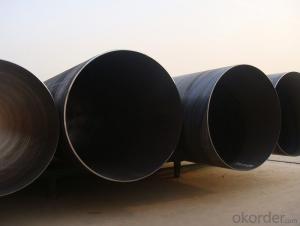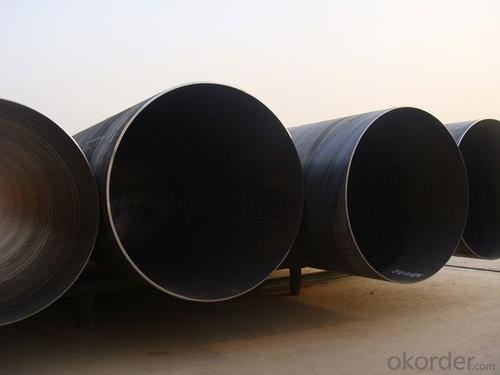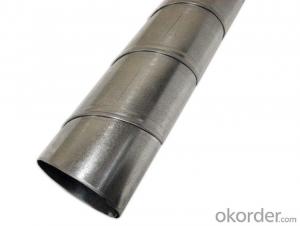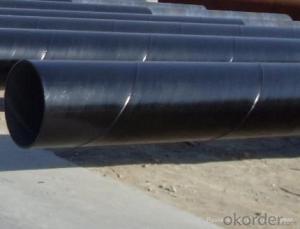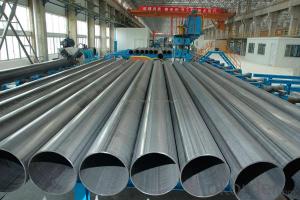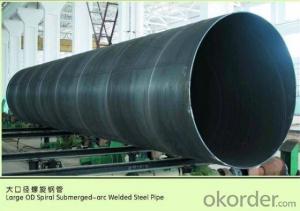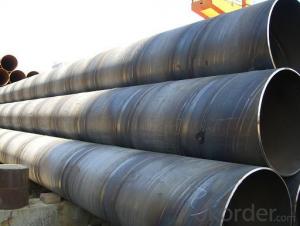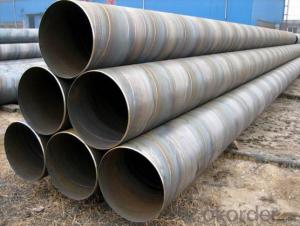SPIRAL WELDED STEEL PIPE 48 LARGE DIAMETER CARBON
- Loading Port:
- Tianjin
- Payment Terms:
- TT OR LC
- Min Order Qty:
- 5 m.t
- Supply Capability:
- 3000 m.t/month
OKorder Service Pledge
OKorder Financial Service
You Might Also Like
Packaging & Delivery
Packaging Detail: | standard export packing or as customer's requirement |
Delivery Detail: | within 10 - 30 days |
Specifications
Spiral Welded Steel Pipes and Tubes
1.Material:Q195-Q235
2.Length:1-12m
3.WT:1.0-14mm
4.O.D.:20-273mm
Spiral Welded Steel Pipes and Tubes
Product Description:
1.Material : Q235,Q345,L245,L290,L360,L415,L450,L485,GrB,X42,46,X52,X56,X60,X65,X70,X80,X100
2,Standard: SY/T5037-2000,GB/T9711-2011,API Spec 5L PSL1/PSL2,ASTM A252\A53,ISO3183,DIN17172,EN10217,JIS G3457,AWWA C200,ASTM A139,ASTM A671,ASTM A672
3.Wall thickness: 3.0mm-30mm
4.Outer diameter: φ168mm-3020mm
5,Length: 5m-12m or as your requirement
6,Corrosion protection standard: DIN30670,DIN30671, AWWAC210, AWWA C203, SY/T0413-2002,SY/T0414-2002
7,Application: Oil, gas, natural gas, water pipe, thermal electricity pipe, steel structure engineering, etc
Q195-q345 Material Steel Pipe's Materials
Elements | Chemical Compsition% | Mechanical Property | ||||||
C% | Mn% | S% | P% | Si% | Yield Point (Mpa) | Tensile Strength(Mpa) | Elongation | |
Q195 | 0.06-0.12 | 0.25-0.50 | <0.050< span=""> | <0.045< span=""> | <0.030< span=""> | >195 | 315-430 | 32-33 |
Q215 | 0.09-0.15 | 0.25-0.55 | <0.05< span=""> | <0.045< span=""> | <0.030< span=""> | >215 | 335-450 | 26-31 |
Q235 | 0.12-0.20 | 0.30-0.70 | <0.045< span=""> | <0.045< span=""> | <0.030< span=""> | >235 | 375-500 | 24-26 |
Q345 | <0.20< span=""> | 1.0-1.6 | <0.040< span=""> | <0.040< span=""> | <0.55< span=""> | >345 | 470-630 | 21-22 |
Packaging & Delivery
Packaging Detail: | Normal exporting packing,in container or bulk vessel or as per clients' request |
Delivery Detail: | 2 months after confimed contract |
Specifications
Large Diameter API 5L X70 PSL2 LSAW Steel Pipe
Grade: X42, X46, X50, X52, X60, B, C
OD: 1.5"-28"
WT: SCH10-SCH160
Brand:TPCO
Large Diameter API 5L X70 PSL2 LSAW Steel Pipe
Specifications:
u Standard: API 5L
u Grade: B, C, X42, X46, X50, X52, X56, X60, X65, X70, X80
u OD: 1.5"-28"
u WT: SCH10-SCH160
u Length: 5-12m
u Ends Finish: plain end, bevel end, grooved end
u Surface Treatment: bare, black varnished, oiled finish, red color, anti-corrosion, 3PE, FBE or epoxy coating
u Technique: hot rolled or cold drawn
u Application: api 5l steel pipe for conveying oil, water, gas
u Invoicing: based on theoretical weight or actual weight
u Payment Terms: L/C at sight, T/T or Western Union
u Trade Terms: FOB, CFR, CIF
u Certification: ABS manufacturing assessment, ABS design assessment, API 5CT, API 5L, DNV manufacturer certificate, ISO9001 quality management system certificate, ISO14001 environment management system certificate, GB/T28001 occupational health and safety management system certificate, A1 class manufacturing license of special equipment certificate, CCS, GL, LR, SGS, TüV, PDE
- Q: What is the difference between seamless steel pipes and seamless stainless steel pipes?
- The main difference between seamless steel pipes and seamless stainless steel pipes lies in their composition. Seamless steel pipes are made from carbon steel, which contains mainly iron and carbon. On the other hand, seamless stainless steel pipes are made from an alloy of iron, chromium, and other elements like nickel and molybdenum. The addition of these elements in stainless steel pipes provides enhanced corrosion resistance, making them suitable for applications where corrosion is a concern. Additionally, stainless steel pipes typically have a higher tensile strength and better heat resistance compared to regular steel pipes.
- Q: How are steel pipes tested for quality control?
- Steel pipes are tested for quality control through various methods such as visual inspection, dimensional checks, and non-destructive testing techniques including ultrasonic testing, magnetic particle inspection, and hydrostatic pressure testing. These tests ensure that the pipes meet the required specifications, standards, and structural integrity, ensuring their quality and reliability.
- Q: How are steel pipes used in the manufacturing of food processing machinery and equipment?
- Due to their numerous advantageous properties, steel pipes are essential in the manufacturing of food processing machinery and equipment. They are widely used in the food industry for their durability, ability to withstand high temperatures and pressures, and resistance to corrosion. The primary use of steel pipes in food processing machinery is for transporting fluids and gases. These pipes are responsible for carrying water, steam, liquids, air, and gases throughout the processing plant. By utilizing steel pipes, the food industry can ensure the reliable and hygienic transfer of these substances, maintaining the quality and safety of food products. Steel pipes also play a crucial role in the design and construction of food processing equipment such as mixers, blenders, conveyors, and canning machines. These machines require pipes to facilitate the movement of ingredients, processing fluids, and cleaning agents. Steel pipes, with their high strength, can handle the heavy loads and pressures associated with food processing operations, making them an ideal choice for such applications. Another significant benefit of steel pipes in food processing machinery is their resistance to corrosion. With the use of various acidic and alkaline substances, as well as hot water and steam, corrosion can occur in other materials. However, steel pipes, especially those made from stainless steel, exhibit a high resistance to corrosion. This ensures that the machinery remains in optimal condition, prolonging its lifespan. Furthermore, the smooth internal surface of steel pipes allows for efficient and hygienic cleaning. This minimizes the accumulation of food particles and contaminants, which is crucial in the food industry. By maintaining high levels of cleanliness, the growth of bacteria can be prevented, ensuring food safety. In conclusion, steel pipes are indispensable in the manufacturing of food processing machinery and equipment. Their durability, resistance to corrosion, ability to handle high temperatures and pressures, and hygienic characteristics make them the ideal choice for transporting fluids and gases, as well as constructing various food processing equipment.
- Q: What is the maximum allowable stress for steel pipes?
- The maximum allowable stress for steel pipes depends on various factors such as the grade of steel, diameter, wall thickness, and the intended application. It is typically determined by industry standards and codes, such as the American Society of Mechanical Engineers (ASME) Boiler and Pressure Vessel Code. Therefore, there is no one-size-fits-all answer to this question.
- Q: How are steel pipes used in the manufacturing of agricultural machinery?
- Steel pipes are commonly used in the manufacturing of agricultural machinery as they are strong, durable, and resistant to corrosion. They are used to create the framework and structural components of various agricultural equipment such as plows, tillers, planters, and harvesters. Steel pipes provide stability and strength to these machines, allowing them to withstand heavy loads and operate efficiently in tough farming conditions.
- Q: Can steel pipes be used for underground air supply systems?
- Yes, steel pipes can be used for underground air supply systems. Steel pipes are often used in underground applications due to their strength, durability, and resistance to external factors such as corrosion and impact. They can withstand the pressure and temperature requirements of air supply systems and can be easily installed underground. Additionally, steel pipes have a long lifespan, making them a cost-effective choice for underground air supply systems. However, it is important to consider factors such as soil conditions, potential for corrosion, and local regulations when selecting the appropriate steel pipes for the specific underground air supply system.
- Q: What's the difference between hot dip galvanizing and cold galvanizing? Which kind of galvanizing method is good?
- Cold galvanizing refers to the zinc plating, the coating is thinner, corrosion resistance is slightly worse, variable color. Environmental pollution.Hot dip galvanized by molten zinc ingots, the coating thickness can be adjusted, good corrosion resistance, and subsequent passivation, can be used for outdoor rust, long service life, some up to 20 years.
- Q: How are steel pipes used in the construction of oil and gas pipelines?
- Steel pipes are commonly used in the construction of oil and gas pipelines due to their strength, durability, and resistance to corrosion. These pipes are primarily used for transporting oil and gas over long distances, ensuring a reliable and efficient flow of these resources. The steel pipes are welded together to form a continuous pipeline that can withstand high pressure and extreme weather conditions. Additionally, their smooth interior surface minimizes friction and allows for efficient transportation of oil and gas.
- Q: How are steel pipes used in the mining industry?
- Steel pipes are widely used in the mining industry for various purposes such as transporting water, slurry, and other fluids, as well as for ventilation and structural support in underground mines. Their durability, resistance to corrosion, and high pressure capacity make them ideal for these applications.
- Q: What is the lifespan of a steel pipe?
- The lifespan of a steel pipe can vary depending on several factors such as the quality of the pipe, the environment it is exposed to, and how well it is maintained. However, on average, a properly installed and maintained steel pipe can last anywhere from 20 to 50 years.
Send your message to us
SPIRAL WELDED STEEL PIPE 48 LARGE DIAMETER CARBON
- Loading Port:
- Tianjin
- Payment Terms:
- TT OR LC
- Min Order Qty:
- 5 m.t
- Supply Capability:
- 3000 m.t/month
OKorder Service Pledge
OKorder Financial Service
Similar products
Hot products
Hot Searches
Related keywords
